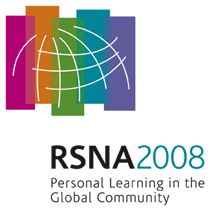
Abstract Archives of the RSNA, 2008
LL-MK4319-B03
The Incidence, Clinical, and Radiologic Findings of Hip Disorders in 17,141 Patients Who Underwent Lumbar Spine MR Examinations
Scientific Posters
Presented on November 30, 2008
Presented as part of LL-MK-B: Musculoskeletal
Hyung Seok Kim MD, Presenter: Nothing to Disclose
Sang-Ho Lee MD, PhD, Abstract Co-Author: Nothing to Disclose
Soo Beom Kim MD, Abstract Co-Author: Nothing to Disclose
Kyoung Hwan Yoon, Abstract Co-Author: Nothing to Disclose
Clinically, symptoms of lumbar spinal stenosis or radiculopathy may be similar to those originated from hip and pelvic region. When interpreting spine MR, we are apt to see only the routine sagittal and axial images, and focus on spinal disorders. However, we could detect several hip abnormalities on coronal scout images and some patients had chief complaints originated from the hip disorders. The purpose of this study was to present the incidence, clinical and MR findings of the hip disorders.
From Nov. 2004 to Feb. 2008, about seventeen thousand (17,141) consecutive patients’ lumbar spine MR images were evaluated. Coronal scout images were acquired for localization before routine lumbar spine MR study. In order to include hip joints and proximal femurs, we obtained more than five images (from ventral margin of spinal curve to mid-body of spinal curve) with 10 mm silice thickness. We interpreted the scout images as well as spine routine images and then investigated patients' clinical manifestations to evaluate which organs could be causing the patients' symptoms.
Ninety-one patients had hip disorders and overall incidence was about 0.54%. Their mean age was 61.7 years (range, 21-86 years). On clinical and radiologic evaluation, 70 patients had AVN of the hip(s), eight had femur neck fracture, six had hip dysplasia, three had hip subluxation, three had tumor (including two metastatic lesions, one had pelvic expansile mass on MR) and one had marrow infiltrating lesion. Among them, 20 patients underwent hip operation and 40 patients underwent spine operation (four of them underwent both operations). 33 patients (36%) had obvious spinal disorders with incidental findings of hip pathology. Others (64%) had hip disorders with or without spinal problems. Their major clinical symptoms originated from hip were buttock, inguinal and/or leg pains.
Owing to coronal scout images, we could find out serious hip disorders which might be missed during interpretation of lumbar spine MR. Clinical manifestations of the patients are similar to those originated from spinal disorders. Therefore, we must pay attention to not only routine images but also coronal scout images of lumbar spine MR.
Coronal scout images of the lumbar spine MR can show us not only just localization information but also very important extraspinal pathology such as hip disorders that we might pass over.
Kim, H,
Lee, S,
Kim, S,
Yoon, K,
The Incidence, Clinical, and Radiologic Findings of Hip Disorders in 17,141 Patients Who Underwent Lumbar Spine MR Examinations. Radiological Society of North America 2008 Scientific Assembly and Annual Meeting, February 18 - February 20, 2008 ,Chicago IL.
http://archive.rsna.org/2008/6011987.html

